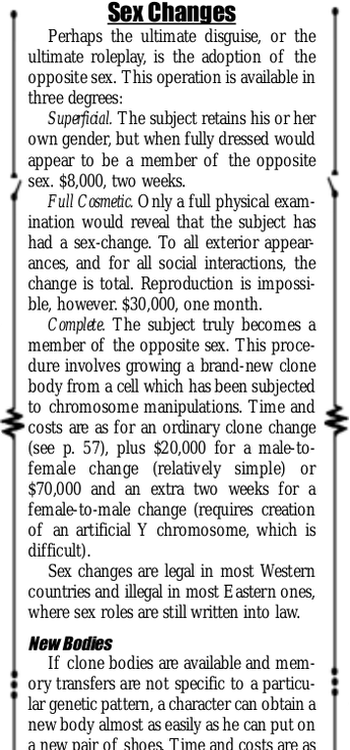“Is Every Woman Here A Sex Change?” — Trans In Cyberpunk RPG

“Take a pretty boy, nip off his couilles and buy him a silicone balcony that could seat an underfed family of three, and before you know it, she’s digging around in your wallet.” — When Gravity Fails, George Alec Effinger
“The Magnetic Dog Sisters were on the door that night, and I didn’t relish trying to get out past them if things didn’t work out. They were two meters tall and thin as greyhounds. One was black and the other white, but aside from that they were as nearly identical as cosmetic surgery could make them. They’d been lovers for years and were bad news in the tussle. I was never quite sure which one had originally been male.” — Johnny Mnemonic, William Gibson
“On this day I want to tell you about, there were a boy, a girl and a love story. Now, although I haven’t said much so far, none of it is true. The boy was not what you and I would normally think of as a boy, because he was a hundred and eighty-seven years old… The reason the girl was not a girl was that she was a boy.” — Day Million, Frederik Pohl
Believe it or not, when Christine Jorgenson first appeared in the public eye in the late 40s/early 50s, her transition was considered a technological miracle. A marvellous Atomic Age tribute to American exceptionalism. “Ex-GI Becomes Blonde Beauty” proclaimed enthusiastic headlines, as her and other “Atomic Age Transsexuals” were celebrated.

Unfortunately, the Atomic Age fascination with transsexuals went pretty much the same way as Fiestaware, from embracing wonder to fear to kitschy acknowledgement, but that is literally a different article. Meanwhile Sci-Fi, like other pulp literature, went back to more abstract coding of queerness. Direct mentions of transgender leanings were extremely rare (Day Million by Frederik Pohl being a notable exception).
But in the 90s, the cyberpunk genre emerged to dust off these Atomic Age artefacts and carefully lay a patina of grunge over them, showcasing them between images of shock value fetish and surprisingly accurate speculation on an internet culture that was barely beginning to exist. Atomic Age fascination with transsexuals as a form of body augmentation fared no differently. The genre, with it’s focus on self-identity, chaos and tech, seemed to go hand in hand with tabletop and computer role-playing, and many series developed congruently with their spin-off RPGs. Hell, even Infocom, the makers of Zork, released a computer game where you could do drugs and hook up with transsexual strippers.

In this article, I’m focusing mainly on the tabletop RPGs, because I believe the rules for such reveal quite a bit of underlying meaning even deeper than cherry-picked quotes. For instance, getting into the actual mechanics of changing sex in these games, it’s worth noting that these rules are always listed side-by-side with things like cybernetic implants and other biomechanical augmentation. For instance:
Cyberpunk 2020: When Gravity Fails
Personally, I really enjoy the source material as a problematic fave. The original book series takes place in a world where the Middle East has become the primary cultural center and The West has declined to third-world status. Arabic is considered the primary language, and cultural turns of phrase are commonly used. This is presented as simply neutral fact, without inserted white persecution fantasies of a Sharia Law dystopia. I still consider this an extremely innovative narrative exploration, and reading this book probably one of the fundamental moments of unpacking my own internalized Islamaphobia.

As well as the cultural location, the second potentially jarring thing about the book series is how common transsexuals are in The Buyadeen (a sort of “anything-goes” Interzone/Chinatown full of criminal scum the series focuses on). I can count the number of women in the first book that aren’t trans on one hand. That said, as could be gathered from the quote at the beginning of the article, the language for the trans characters is, ahem, lacking. And whereas the book treats the subject with all the cultural sensitivity of a Gavin McInnes-era VICE article, the computer game based on the book treats the subject matter with all the cultural sensitivity of an Adam Sandler movie.

Getting a “sex-change” (unfortunate terminology you will see in all of these games) under Cyberpunk 2020 rules has multiple “levels” (something you will also see in other examples). A “Basic” Sex Change takes one month of hormone therapy and nanotechnology injection, a week of surgical stay and two weeks post-op recovery. Altogether the cost is 4200 EuroMarks, which is roughly the cost of a decent pulse laser rifle. The ability to bear children is another 5000 Euromarks, and the ability to sire children is 1000.
Additionally you can pay even more to make yourself less “detectable” (at an exponentially increased cost) and seek counselling to restore the 1d6 Humanity score lost due to the transition. Like other games in this list, medical transition is treated similarly to cybernetic augmentation, and affects your overall humanity negatively. Humanity is a particularly vital score in Cyberpunk 2020 because allowing your score to go too low results in cyberpsychosis, surrendering your control over the character, who then becomes an NPC controlled by the Game Master from then on out.

TORG
Can’t really list off a bunch of cyberpunk RPGs without mentioning TORG. Unfortunately, TORG doesn’t really offer much other than a “Disguise” modifier for attempting to appear as the opposite sex.

Dream Park: The Role-Playing Game
This game is not really cyberpunk, per se, but postmodern science fiction taken to an interestingly extended level. Dream Park is a role-playing game based on a novel about a live-action role-playing game. You create and play a character who then creates and plays a secondary character within a Live-Action Role-Playing Game within the game world, which takes place inside a giant cybernetic amusement park.

Among other augmentations in the game are suits you can wear that drastically alter your appearance, including the ability to change your sex. So if you would like to exercise your role-playing chops thusly, you could create and play a pre-transition character actualizing themselves during the game-within-a-game you are currently playing. I hope that sentence made more sense to you than it did me, because I’m getting a headache.

GURPS: Cyberpunk

Now, this is just bonkers, for more reasons than I can count.
We’ll go ahead and start from that first line about adoption of the mannerisms and appearance of the opposite sex being “the ultimate disguise / roleplay”. Someone involved with this rulebook was clearly working through some issues.
This one also has “levels”, but kinda difficult to parse out. For the sake of this article, I’m gonna guess that “Superficial” is facial feminization + breast implants and “Full Cosmetic” includes both with sex-reassignment surgery. Just spit-balling here mathematically, but even in 1990 dollars vs GURPS dollars that is super-cheap for those surgeries, and the recovery times are about half what they would be in the real world. A hell of a good deal, really.
But then, it jumps straight from fairly realistic (if unrealistically cheap) surgeries straight into cloning or harvesting an entirely new body to spend the rest of ones life in. As I said before, feels like someone was compensating for something in writing this.
With all these examples, the phrasing leaves a lot to be desired (and is occasionally appalling), but it’s an interesting time capsule of edgy 90s retro-futurism. It would be fascinating to see how these tropes could be revisited from the non-othering perspective of folks more versed on how transitioning and how transgender people know themselves and live their experience.
This is my first work of directly subsidized content. Feel free to donate to my Patreon (https://www.patreon.com/destroyed4com4t) if you would like to continue supporting my work in general, or feel free to contact me directly if you would like to sponsor an article in particular.
